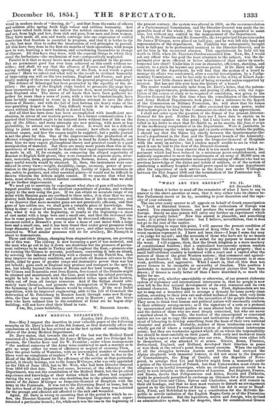ARMY MEDICAL DEPARTMENT.
London, 14th December 1854. Sin—May I request the insertion in your valuable paper of the following remarks on Dr. Davy's letter of the 5th instant, as they materially affect the conclusions at which he has arrived as to the best system of conducting the affairs of the Army Medical Department. Dr. Davy states, that towards the end of the last war the Medical Board consisted of a Director-General, Sir James M'Gregor, and two Principal In- spectors, Sir Charles Kerr and Sir W. Franklin ; under whose management " the medical concerns of the Army were conducted in such a manner as to give no scope either for want of efficiency or neglect of econonay.Then, after the great battle of Waterloo, with an unexampled number of wounded there were no complaints of neglect." * * a * Now, if credit be due to the Head of the Medical Board for the efficiency of the service at that particular period, it clearly belongs, not to Sir James M'Gregor, who was only appointed on the 13th of tune 1815, but to Mr. Weir, who had been Director-General from 1810 till that date. The real cause, however, of the efficiency of the Department, was not the constitution of the Medical Board, but the practical experience and knowledge of their duties which the officers had acquired during the war; and much was also doubtless due to the admirable arrange- ments of Sir James M'Gregor as Inspector-General of Hospitals with the army in the Peninsula. It was not to the Governing Board at home, but to the active head of the Department in the field, that the Army was indebted for the prompt and efficient aid afforded to the sick and wounded. Again, Dr. Davy is wrong in assuming that at the period to which be re- fers, the Director-General and the two Principal Inspectors each super- intended a particular branch ; for, while such was the case in the beginning of the present century, the system was altered in 1810, on the recommendation of a Parliamentary Commission, and the Director-General was made the re- sponsible head of the whole ; the two Inspectors being appointed to assist him, but without any control in the management of the Department. In 1816, Dr. Franklin and Mr. Somerville, the two principal Inspectors under Sir James M'Gregor, were placed on half-pay, and he was left sole bead and representative of the department. Dr. Franklin was subsequently brought back to full-pay to be professional assistant to the Director-General, and to act for him in his occasional absence. This appointment he held till his death in 1833, when Dr. Theodore Gordon succeeded him. Now, Sir, I would ask any officer who has paid the least attention to the subject, was the de- partment ever more efficient or better administered than under its much- respected late chief? Under him it rose in character, efficiency, standing, and comfort, to a pitch far beyond any previous period. If Dr. Davy will study the history of the department, he will find that the system of a board to manage its affairs was condemned, after a careful investigation, by a Parlia-
mentary Commission; he has only to refer to the works of Robert Jack- son to see how little hance merit had of being rewarded unless supported by interest. But has not this ever been the history of a board ?
The reader would naturally infer from Dr. Davy's letter, that the patron- age of the appointments, promotions, and posting of officers, with the regu- lation of the course of study to be required of candidates, was given to the Director-General for the first time when the consolidation of the Ordnance and Army Medical Departments took place; but a reference to the Report of the Commission on Military Promotion, Stc. will show that Sir James M`Gregor during his long tenure of office exercised the same power, under instructions given to him by the Commander-in-chief on his appointment. I shall not enter upon the question of the fitness of the present Director- General for his post. Neither Dr. Davy nor I hare data to enable us to form a correct opinion on this point; but I take leave to say that he has failed in his letter to show that Dr. Smith is, as he asserts, the Pons et origo of the inefficiency complained of in the Department. Were it justifiable to form an opinion on the very meagre and ex-parte evidence before the public, I should say that the blame lay chiefly between the Quartermaster-Ge- neral's department in the East and the Transport branch of the Admiralty. Some of it may perhaps also fall upon the Inspector-General of Hospitals with the army on service ; but I confess myself unable to see in what re- spect it can be laid to the door of the Director-General. In conclusion, Sir, I may observe that it is too much to expect that a De- partment which had been reduced to a minimum peace establishment, and suddenly augmented to meet the requirements of an army of 30,000 men on active service—the augmentation necessarily consisting of officers who had no previous knowledge of the duties and habits of soldiers, or of the system of conducting a military hospital—should prove equal to the same department after the experience of such service as the Army saw under Wellington between the 21st August 1808 and the termination of the Peninsular war. I am, Sir, your obedient servant, T.




































 Previous page
Previous page